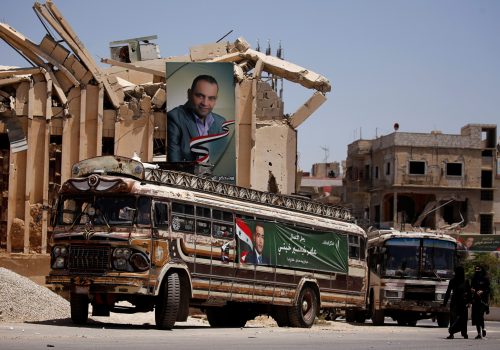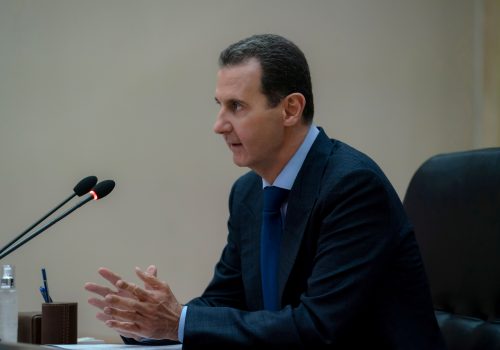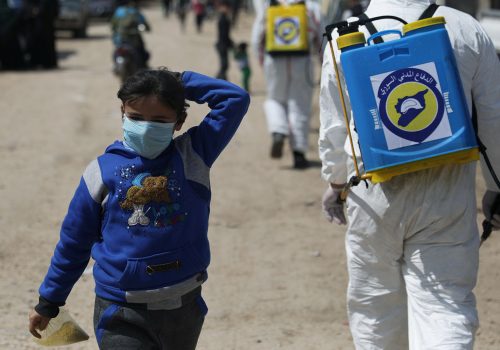The American moment: Creating a new balance of power in Syria
Bashar al-Assad is at his weakest. The recent protests in Suwaida, the brutal crackdown by the Syrian security apparatus, and the declaration that made Daraa independent from Damascus show the Assad regime’s inability to consolidate power in order to achieve reconciliation. Ironically, the declaration by Daraa residents was made in the presence of the Russians, signaling a decrease in support for the brutal dictator from its most important ally. Additionally, the almost nonexistent turnout among Syrian minorities—Christians, Druze and Alawite—who were his core base, at the ballot for the July 19 parliamentary elections demonstrates that Assad has lost his standing as the protector of minorities. The United States should seize this moment on changes in the Syrian landscape to create a new balance of power in Damascus.
Assad is running away from his internal problems and is trying to rally the remainder of his supporters by directing the fight against Turkey in Idlib province. Turkey is standing firm in pushing back against regime advances and defending its current positions. It even hit a base that houses Russian troops for the Syrian Democratic Forces, sending a message that even Russia cannot intimidate Turkey. To save face, Assad halted the assault on Idlib by claiming that he wanted to protect his troops from COVID-19.
Russia on the other hand, has reached its limit in Syria. Its ally lives in his own bubble. Obsessed by victory, Assad is not willing to make any concessions in order to reach a political solution. Hence, he is currently more of a liability than an asset to the Russians. Lebanon, the Syrian regime’s lung, is crashing under the weight of its own economic problems. Relatedly, the economic situation is getting worse in Syria, with more than 80 percent living below the poverty line, which is likely to put further pressure on the Russian presence there. However, despite Assad’s weakening position, Turkey is not making any advances and the situation in the northwest seems to be at a standstill.
The Caesar Act, if followed up by the right actions, will secure an important win for the United States. The Caesar Act is supposed to dry the Assad regime’s primary source of income. However, presently, the act has succeeded more at sending political messages than hurting the regime economically. Relevant personalities who do dealings in Lebanon and Syria are still not designated by sanctions. Additionally, the process has been slow. The US should be strict in applying sanctions to individuals, business, and even states that offer any help to Assad. No exceptions should be made, even for US allies, for any activity outside of the exempted humanitarian aid. Even that should be closely monitored as an important portion of United Nations (UN) aid has been going through Assad-affiliated charities, some of which are represented by high-ranking members of parliament. Therefore, the UN should properly vet the delivery channels by employing third party auditing in an effort to sideline the regime from the process.
The US should also be vocal in its willingness to support Turkey in launching an offensive military campaign to push the Syrian regime to retreat. It will make Assad look weak and cause him to lose legitimacy in front of his supporters. It will also deliver a major win to the Trump administration.
Syria’s importance spans beyond its borders and, consequently, the crisis represents grave problems for US allies. For Saudi Arabia and Israel, the crisis was an enabler for Iran. For Europe, it has generated several waves of refugees. It has also encouraged the rise of terrorism, as seen by numerous attacks on European soil that have created social problems at home and galvanized the extreme right. Solving the Syrian crisis will render a great service to Europe and will help strengthen their ties with the United States. Thus, there is an urgent need to end the war and to facilitate “the safe, voluntary, and dignified” return of Syrian refugees per UN Resolution 2254.
After demonstrating committed involvement, the Trump administration should call on Russia and Turkey to make a deal on the upcoming 2021 Syrian presidential elections—a deal that excludes Assad. The deal can be presented to the UN Security Council as a type of resolution on Syria.
If the US can follow through with this, they will have seized a unique opportunity to effectuate change and destabilize a vulnerable regime. The ball is in the United States’ court.
Ayman Abdel Nour is a noted Syrian reformist. He is also the editor-in-chief of All4Syria (Syria’s leading independent news outlet), and the president of the non-profit Syrian Christians for Peace
Dr. Dania Koleilat Khatib is the founder of the Research Center for Cooperation and Peace Building (RCCP), a Beirut-based NGO focused on track 2. She is an affiliated scholar at the Issam Fares Institute for public policy and international affairs at the American University of Beirut.
Image: Syria's President Bashar al-Assad and his wife Asma cast their vote inside a polling station during the parliamentary elections in Damascus, Syria in this handout released by SANA on July 19, 2020. SANA/Handout via REUTERS


